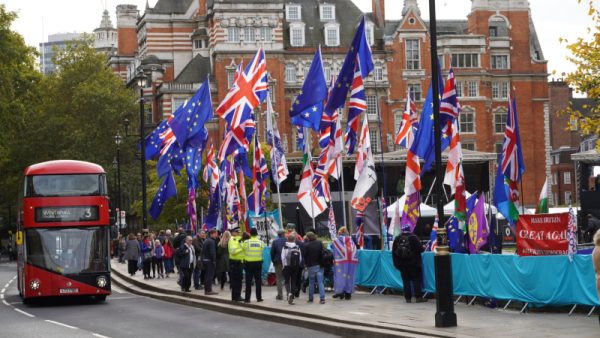The UK didn’t need the EU to enjoy multiculturalism – quite the reverse
This blog post was written by Tariq Madood, Professor of Sociology, Politics and Public Policy and Director of the Centre for the Study of Ethnicity and Citizenship at the University of Bristol.

Progressive opinion in the UK has long assumed that to be pro-EU is to be pro-multiculturalism and vice versa. The truth is more complex.
Take the arch-Europhile Roy Jenkins, who as a senior minister in British Labour Party governments in the 1960s and 1970s introduced explicit racial equality legislation – a first for Europe – and then became president of the European Commission.
In fact there is no special connection between these two causes. Indeed, Jenkins seemed to come back from his European post cooler on multiculturalism: he rarely spoke of it afterwards, and, after the Ayatollah Khomeini called for the assassination of British writer Salman Rushdie for his portrayal of the Prophet Muhammed and his wives in the novel ‘The Satanic Verses’, Jenkins wrote in The Observer that the UK should have been more careful in allowing so many Muslims in.
In the 2016 Brexit referendum I voted Remain and think that the UK has made a big mistake in leaving the EU. This is quite independent of my view of multiculturalism. British multiculturalists and anti-racists such as myself have not looked to Europe for guidance, though we have in our own vanity hoped we might be an example and pathfinder to Europe – in the way, perhaps, that the Nordic countries have been in relation to gender equality. But much of Europe did not want to go down the British multicultural path.
So, whether Brexit will be bad for multiculturalism in the UK is unclear but it is likely that Europe will become less multiculturalist without the UK’s lead – just as Canada without Ontario would be less multiculturalist.
One manifestation of this is that even now no country in the EU has equality legislation to match the UK’s 2010 Equality Act.
Another is how the new Black Lives Matter and decolonisation types of anti-racism are much stronger in the UK than in Europe, suggesting that Brexit will not be bad for multiculturalism in the UK; that we have our own dynamism independently of and in contrast to Europe.
As is well known the single biggest reason people gave for voting Leave was immigration: to reduce it or at least control it more carefully. It is perhaps less well known that about a third of ethnic minority voters, especially British Indians, voted to Brexit. They did so partly because they too thought immigration was too high but also because they wanted to reduce the privilege enjoyed by European migrants, who had freedom of movement within the EU, and were largely white, over those from the rest of the world, most of whom were non-white.
The UK continues to be a leader in the region in relation to racial equality laws and policies
Since Brexit, white European migration into the UK has declined and non-white migration from the rest of the world has increased. There is a certain racial justice in this as it places white European migrants on the same footing as everyone else.
The EU, meanwhile, continues to allow transborder white migration at much higher rates than non-white migration. This is also seen in the contrasting responses to Ukrainian and Syrian refugees – the former welcomed, the latter relatively excluded. The EU’s preference for the Ukrainians reflects a European, not just a white, identity solidarity. The UK government and public too has proudly asserted this preference in the military support it has offered as well as (temporary) hospitality to refugees, suggesting a positive European identity among the British that has survived their country’s departure from the EU.
On the other hand, the UK now co-operates less on migration policy with the EU and specifically France, with whom cooperation is essential in relation to the wretched Channel crossings. There is a desire by parts of the ruling Conservative Party for the UK to have its own Charter of Rights, not adjudicated at the European Court of Human Rights.
The argument is that modern human rights are a contentious extension of the common-law-evolved ‘rights of an Englishman’ originating in the rights the king was forced to give the nobility in the Magna Carta of 1215 (paralleling the French narrative of the Rights of Man of 1789) and so a retrenched set of rights would be more British. The majority of Tory voters – but not all voters – wants UK laws and courts to interpret human rights and not be over-ruled by an overseas court as is in Canada and most countries in the world.
After the Brexit vote, won as it was on concerns about the control of migration, public anxiety about migration subsided. But it has in re
cent months come back to the centre of British politics, so in that sense Brexit solved little. It might have reduced white European migration, but it has not led to more control of numbers nor a fair and workable system – but we are at least failing in our own way.
The UK continues to be a leader in the region in relation to racial equality laws and policies, to the presence of ethnic and religious minorities in public life, including at the highest levels of government: not just the appointment of a British-Indian Hindu as prime minister but in the disproportionate presence of ethnic minorities in recent Cabinets, and in remaking the national identity so that it is not just monocultural, white and Christian/secularist.
This is still disappointing to those of us who had hoped to have become a more multiculturalist country. But it will be interesting to see how equality, diversity and inclusivity fare in the EU in the absence of the UK.
This blog post was originally published on Open Democracy, you can read the original post here.
